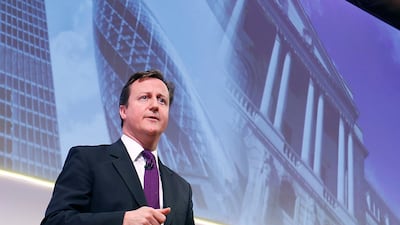In the City this week, there is much scratching of heads and yes, some laughter, but also a fair degree of anger and frustration.
As soon as the cabinet reshuffle got under way, the messages and emails started flowing – most centred on the appointment of David Cameron as Foreign Secretary.
“Is it true?” asked one correspondent, who, presumably, was not near a screen and could not see footage of the former prime minister ambling along Downing Street and through the door which used to be his home. I had to inform him that indeed it was. He still said he could not believe it.
I thought of him as working as a senior fund manager in a global financial powerhouse. He oversees a division that invests several billions of pounds for its clients. Every day they make decisions that have serious consequences.
They work as a unit, each knowing what the other is doing, all of them trusting and relying on their colleagues. That dependence, their solidity, is transferred to their clients. That’s why they are entrusted with other people’s money.
They have a chemistry, a bond, that builds up over time. When they change personnel, which is rarely, they do so carefully, ensuring that whoever they choose forms a perfect fit.
They don’t always get it right, of course they don’t. But on most occasions, they do.
Then they look at the government, which is charged with running Britain, setting the strategy for a vast public machine that delivers education health, welfare, defence, social care, transport, law and order and the rest, and they’re baffled – utterly perplexed, to the extent that it’s humorous.
Except it’s not funny and definitely not imaginary. It’s extremely real.
An ex-chief executive is brought back after being in the wilderness for seven years. In that period, he’s been criticised for displaying poor judgment when pushing his old boardroom pals to act favourably towards a finance firm that was failing and in which he had a personal interest.
He also gave an interview in which he proclaimed categorically that he had no desire to return. Still, forget all that. Cameron is awarded one of the top four posts in government.
How does that work? Does Cameron bite his lip in meetings with his new boss and resist saying, “Well in my day…”? Or does he come out with it, telling Rishi Sunak what he did in similar circumstances?
How irritating is that, having the ex-chief sitting across the table? Do ministers and officials automatically defer to him, not helping themselves, regarding Cameron as remaining in charge?
In the corporate world, there are heavyweight figures who move, seemingly effortlessly, between substantial, demanding posts – folks like Stuart Rose, Howard Davies, Roger Carr, Archie Norman. No one criticises these omni-chairmen for taking up a new position. They’ve got track records of success behind them; they also have a tried and tested formula for working.
They know how to get the best out of management, they probe and challenge, they spot talent and the not-so talented, and they encourage and motivate. They’re judged by results and they do not run when things g awry – fudging and blaming others will not wash.
Nothing approaching that is visible on the political side of the fence. Instead, there seems to exist a permanent situation of chaos, of doors revolving at such speed that the occupants do not know whether they are coming or going.
Neither, let us remember, do those who work with them.
One moment, as foreign secretary, James Cleverly is touring Middle East capitals, seeing fellow leaders, urgently assessing the ramifications of the Israel-Gaza war; another, he’s in Beijing, greeting the main power-players at an acutely sensitive period in Anglo-Chinese relations.
The next, he is gone. Kaput. Now, his brief includes UK domestic policing and the stopping of small boats of migrants from crossing the Channel.

Barring a return to the Foreign Office – and stranger things have happened, just look at this latest round of rearranging, that as well as Cameron saw Damien Hinds, once education secretary, made a junior education minister – or Cleverly’s ascent to prime minister, those overseas dignitaries he was cultivating and wooing are unlikely to ever see him again.
Cleverly was shunted to the Home Office, to succeed Suella Braverman. Again, you’re the chief executive and you hand a key division to a person you know will not toe the corporate line, who will defy the rules on speaking out publicly, who wants your job and will do all she can to undermine you.
Crazy, isn’t it? But that’s exactly what Sunak did. Cleverly solved a headache, but it was a problem entirely of Sunak’s own making. The friction caused by Braverman and her subsequent ousting were totally predictable.
Nothing matters more to this regime, we’re assured, than housing. In speech after speech, Sunak has cited the requirement to construct more houses. It was a central 2019 Conservative manifesto pledge, to build one million homes over the course of the parliament. They are nowhere near to reaching that target.
But is that a surprise, given we’re now on our 16th housing minister since 2010? Rachel Maclean has been sacked after nine months. No matter that Maclean was widely thought to be performing well.
One member of Sunak’s senior team, Business and Trade Secretary Kemi Badenoch, even and somewhat rebelliously openly described Maclean as an “excellent minister” who had been “always attentive to MPs and their constituents and got some very tricky legislation over the line”. Badenoch, though, is another with her eye on the main prize, tipped as a possible future leader.
Maclean duly declared her disappointment and wished her successor well. On it goes, the great British ship of state, lurching from side to side, barely staying afloat. Its captain, if he was ever given to bouts of self-reflection, may just question why other vessels travel so much more quickly, and why their engines function so much more efficiently and smoothly.








